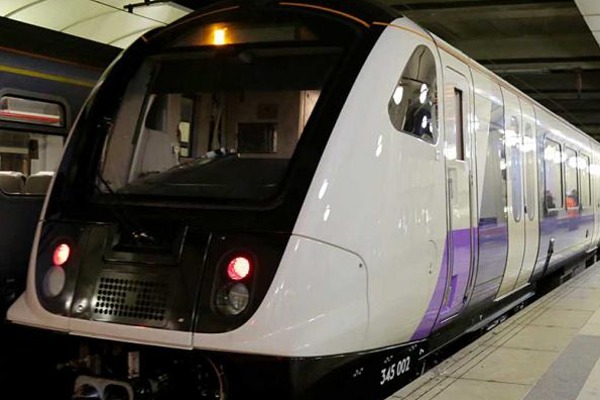A mix of delight and scepticism among Thames Tap partners greeted the news that Crossrail is to start operating later this month.
The step forward announced by TfL last week could not mask the frustration of the continual delays and overrunning costs which have come to characterise the Elizabeth Line project.
The service, initially due to open in December 2018, will officially open on May 24, although direct through services between Reading and Central London are not going to be operational yet.
Hugo Haig, director of Lochailort, said: “A truly delightful announcement but in reality what a shame. It is a tragedy not a triumph.
“It reflects a gross mismanagement of a strategic and important project to a degree of ineptitude that is unforgivable, both in terms of delay and cost.
“The South East has waited since 2018 for its delivery and it has cost the taxpayer an additional £4 billion, excluding all the associated businesses’ costs as a consequence.
“There should be an inquiry into what went wrong and who is to blame – I suspect that one need look no further than TfL.
“HS2 is also on track for mind blowing over-budget figures and delays – but none of us will be around to write a similar comment, which shows how tragic it is.
“The Elizabeth Line will no doubt be a godsend to anyone who travels east-west and vice versa but I suspect the only thing to say is God Save The Queen.”
Alexa Peters, head of residential development for Savills Reading, said: “The countdown is now on for the long-awaited opening of the Elizabeth Line. With 12 trains an hour all day, every day, running in both directions, the new line will undoubtedly be a game-changer for a large number of Thames Valley commuters travelling to, from and within London.
‘The opening has been subject to a huge amount of speculation in terms of its impact on regeneration and value growth in areas along its route.
“In the new homes market, towns such as Reading and Slough are attracting the attention of owner-occupiers and investors and, while values have yet to outperform the wider market, we expect this to change once the line is in use and the impact of reduced journey times becomes a reality.”
Philip Waddy, managing director of WWA, said: “Well it might be late and massively over budget but, as Europe’s biggest engineering project, the complexities were always going to be extraordinarily challenging.
“The fact it’s happened at all is something of a miracle in our risk averse world where investment in public infrastructure is so tightly restricted.
“When we get used to relying on the Elizabeth Line to get into and across London in no time at all, we’ll all wonder how on Earth we managed beforehand. It will also boost the economies of the outlying areas like Reading in the west and Brentford in the east. A faster link to Heathrow is a welcome bonus. Now, what about that third runway?”
Jonny Denton, residential sales manager for Darcliffe Homes, said: “It’s funny. After the initial boom to the property market once the announcement was made way back, my experience is that any excitement has long since tailed off, as the majority started to question whether this day would actually arrive.
“My only working experience of Crossrail is trying to remember to update our sales brochures at the turn of every year from ‘and will connect to Crossrail in 2018′, to ‘2019’, to ‘2020’. We then got fed up and said ‘connecting to Crossrail soon’.
“Having been involved in property sales for five years, I can’t remember ever having a serious conversation with buyers or sellers about the impact Crossrail had on their decisions or motivation as it wasn’t remotely real then. Once again, I sensed a lack of belief.
“So much so, you would expect, based on it being on the back burner for a few years, its arrival should help continued demand for home buying in the Thames Valley.
“Even with the incredible growth we have seen in house prices and buyer demand since the Summer of 2021, you still get an awful lot more value for money in the Thames Valley when compared to London.
“Plenty of young people are paying high rents in the likes of Clapham, Balham, Brixton etc and still have long commutes to offices in the City, via the underground, so it will be interesting to see if Crossrail encourages first time buyers out of the City into the Thames Valley. Or will it continue to be young families heading out for more space/leafy surrounds?
“Affordability is also a question mark. How much would a ticket cost in order to use the train? Does the move to being within the commuter belt actually make financial sense?
“The announcement only really attracts excitement around the grand opening of the Elizabeth Line. However, to celebrate a project billions over budget feels wrong to us property people.
“Having to work to tight margins in a world of material shortages and price rises, it is always frustrating to see taxpayers’ money spent irresponsibly and wasted. How different would the project have been if it was someone’s personal money being used?”
Laura Fitzgerald, director of mode transport planning, said: “Whilst the cost overrun and the delays to opening have plagued the Elizabeth Line for years now, we can at least start to see the benefits that the new line will bring.
“The true benefit won’t be felt in Reading until the full line opens and then the difference that getting on a single train from the town and getting off in Central London will be huge, both in terms of time and convenience.
“The boost to accessibility to and from Reading (and Twyford, Maidenhead, Slough etc) will be a huge boost for residents and businesses alike.
“The true scale of the Elizabeth Line has to be seen in person. The length of the trains and the new stations in Central London will vastly improve the look and feel of travelling underground across the city.”
Brian Dowling, partner in the residential development team at Boyes Turner, said: “The delays and cost overruns have caused consternation, but you can really see a continued ‘Crossrail effect’ that resonates with buy-to-let and other investors.
“You can also see the benefits of towns east of Reading having improved access to Heathrow, the West End and the City.
“Reading has always seemed to me to be a ‘railway town’, known to be well connected, but this new line should also help attract people looking to work within Reading and the region, and to minimise their reliance on the car.”
Karen Jones, planning and environmental law partner for Blandy & Blandy, said: “Despite the delays, we have we seen huge benefit during construction – the buoyant Thames Valley market is undoubtedly benefiting from the vast supply chain.
“We now have direct connectivity to Central London and the line will continue to drive regeneration along the length of the route.
“It has been projected that the new line will support the delivery of over 90,000 new houses. Nearly half of planning applications within a kilometre of an Elizabeth Line station have cited the new railway as a justification for the development proceeding, equating to around 5.3 million sq ft of residential, commercial and retail space.”
© Thames Tap (powered by ukpropertyforums.com).
Sign up to receive your free weekly Thames Tap journal here.
















